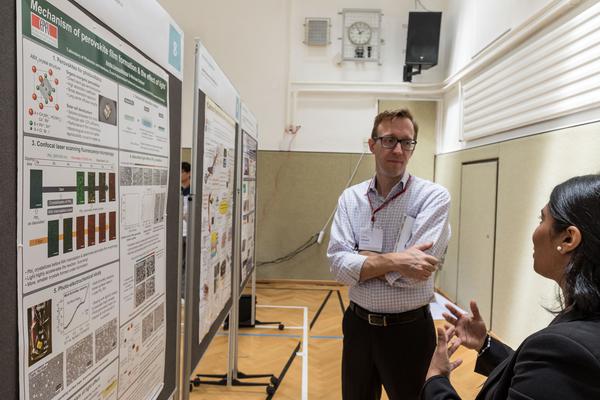Amita Ummadisingu presents research at 67th Lindau meeting

Ummadisingu giving her poster-flash on the the effects of light on perovskite film formation. ©Christian Flemming/Lindau Nobel Laureate Meetings
Amita Ummadisingu, a PhD student with Michael Grätzel’s lab, was invited to attend this year’s Lindau meeting and present her work published in Nature.
Each year, at Lindau (Germany) on the shores of Lake Constance, Nobel laureates and young researchers gather to take part in the Lindau Nobel Laureate Meetings. The focus of the meetings alternates between Physiology and Medicine, Physics and Chemistry, and aims to foster dialogue between scientists of different generations, cultures, and disciplines. The meetings also give selected young researchers a unique chance to present their work in the form of a poster session and master classes, and receive feedback from the Nobel laureates and other participants.
This year, the 67th Lindau Nobel Laureate Meeting in Chemistry (25-30 June) was attended by 420 participants, including 28 Nobel laureates and one Turing Award recipient. The participants came from all over the world and included undergraduates, PhD students, and postdocs up to 35 years of age.
Amita Ummadisingu, a PhD student at Michael Grätzel’s lab, was invited to attend this year’s Lindau meeting. She was one of the 30 young scientists to present a poster, chosen out of more than 300 submissions. This year, the young scientists were introduced to poster-flashes: two-minutes to give an elevator-pitch about their research (Ummadisingu's talk begins at 20:22).
Ummadisingu presented her work on the extraordinary effect of light on perovskite film formation, recently published in Nature(EPFL press release here). This research has implications for the fabrication of new opto-electronic devices using perovskite materials such as solar cells and LEDs.

Ummadisingu during the poster session presenting her work on the mechanism of perovskite film formation and the effect of light (to Joshua Schnell of Clarivate Analytics). Credit: ©Christian Flemming/Lindau Nobel Laureate Meetings
The meeting also included talks by the Nobel laureates and offered ample opportunities for for young scientists to interact with them. This year, the Heidelberg lecture was given by Joseph Sifakis, the recipient of the Turning Award 2007. Professor Sifakis, who received an honorary doctorate from EPFL, gave a highly informative talk titled ‘On the Nature of Computing’.